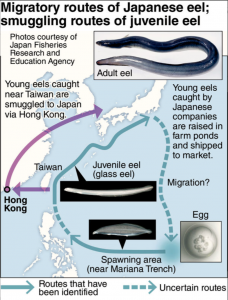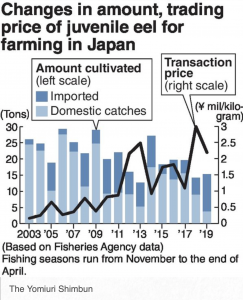Price surge behind glass eel poaching
Published on 23 July 2019 in The Japan News by the Yomiuri Shimbun
Catches of juvenile Japanese eels, known as glass eels, hit a record low of 3.7 tons this season, from last November until this April, according to the Fisheries Agency.
Ahead of Doyo no Ushi, a traditional eel-eating day that will fall on July 27 this year, the market price of juvenile eel has reached over ¥2 million per kilogram. Poaching and smuggling of juvenile eel — now called “white diamond” — are rampant.
¥2.19 mil. per kilogram (about 18,000 EUR)
On June 28, two men were found guilty of illegally fishing glass eel in a river in Hamamatsu, and were sentenced at the Hamamatsu branch of the Shizuoka District Court. A judge said to the men, who included a company executive from Aichi Prefecture, “[The poaching of glass eel] may seriously affect the protection of fishery resources and impair the maintenance of fishery order.”
Earlier this year, eel poaching was revealed in Ibaraki, Okayama and Kochi prefectures and elsewhere.
Most Japanese eel on the market — 99 percent of the total — is farmed. The eels hatch from eggs near the Mariana Trench in the Pacific Ocean, and as they grow, they are carried by the ocean current to the sea near Japan. There, they are caught by fish farming companies around river mouths. Each eel weighs about 0.2 grams initially. The companies raise them in farming ponds and ship them when they weigh about 200 to 250 grams each. This season’s catches of glass fish were below the record low of 5.2 tons in the 2013 season, November 2012 to April 2013.
As a result, the price of eel has risen. According to the Tokyo Metropolitan Central Wholesale Market, the average price of adult fish in May was ¥5,179 per kilogram, twice that of 10 years ago when it was ¥2,529 per kilogram in May 2009. The market price of glass eel has also soared, being traded at around ¥2.19 million per kilogram.
In the eyes of the law, juvenile eel can only be caught by groups licensed by prefectural governments. Kenzo Kaifu, associate professor at Chuo University, pointed out that some poached young fish are traded at high prices through black market channels. He specializes in conservation ecology and is an expert on the distribution of eel.


